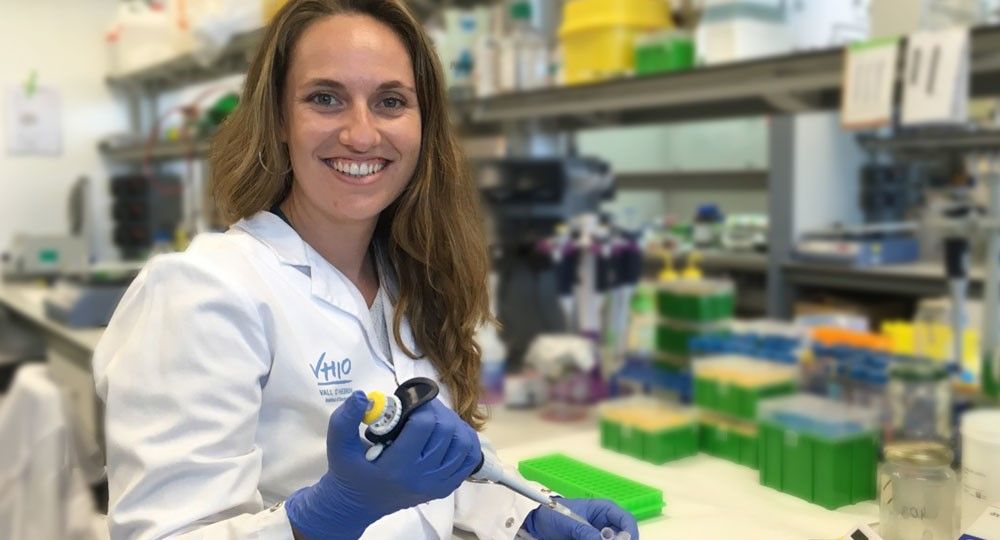
Published open access and ahead of print in Nature Communications last week, Elena Senís, Post-Doctoral Fellow of VHIO’s Cellular Plasticity & Cancer Group headed by María Abad, has first authored a proof-of-principle study* preclinically validating a novel in vivo reprograming technology. This new approach is based on Adeno-associated viruses (AAV) as vectors each containing one of the four genes that are collectively required to trigger pluripotency of differentiated cell: Oct-3/4, Klf4, Sox2 and c-Myc; so called OKSM.
Carried out in collaboration with co-first author Lluc Mosteiro from the former Spanish National Cancer Research Centre’s Tumor Suppression Group, CNIO in Madrid, under the direction of Manuel Serrano (now Group Leader of Cellular Plasticity & Disease at IRB Barcelona), along with other colleagues at the University Hospital of Heidelberg (Germany) led by Dirk Grimm, this research was also the subject of Elena Senís’ thesis that she defended during her studies at Heidelberg University.
For the first time, the team have succeeded in the in vivo reprograming of adult cells into pluripotent stem cells in non-genetically modified mice. More specifically, their new approach using AAV not only constitutes a marked improvement compared with other pervious technologies for cellular “rewiring”, but also promises important advances in regenerative medicine and the swift translation of this technique to the clinic.
The team have generated this highly efficient in vivo reprograming technology through genetic engineering and once OSKM are encapsulated in the viral vectors, they are intravenously administered to mice. It is thanks to the innovative use of AAV – that are innocuous and safe for mammals – that the researchers have devised a much improved cellular reprograming technique that promises a fast track application to the clinic in comparison to other approaches that have reported adverse effects.
Considering the implications for regenerative medicine and commenting for VHIO Communications Elena observed, “Just imagine if we could target these viruses solely to the heart as opposed to elsewhere. We would then be able to regenerate injured cardiac cells following a heart attack. Now, thanks to our novel OKSM delivery vectors we have taken one important step closer in realizing this ambition”.
Of important relevance to oncology, the researchers have also succeeded in reprograming adult cells in vivo without one of the four OKSM: the c-Myc oncogene that is found altered in many, if not all cancers. In vivo reprogramming is also proving its worth in deciphering the molecular and cellular mechanisms that drive healthy adult cells to dedifferentiate and proliferate uncontrollably.
“Previous studies have shown cancer stem cells to be the culprits behind the aggressivity of tumors as well as acquired resistance to therapy and disease recurrence. Now that we have validated our new approach, we will be able to better study the influence of cellular dedifferentiation in cancer models in vivo,” she continued.
“Developing therapies that target cancer stem cells could improve outcomes for certain patients, and dynamic approaches such as our AAV-based cellular reprograming in vivo are opening up avenues towards developing anti-cancer therapies against cancer stem cells,” concluded María Abad, Principal Investigator of VHIO’s Cellular Plasticity & Cancer Group and co-author of the present study.
###
*AAV vector-mediated in vivo reprogramming into pluripotency. Elena Senís, Lluc Mosteiro, Stefan Wilkening, Ellen Wiedtke, Ali Nowrouzi, Saira Afzal, Raffaele Fronza, Henrik Landerer, Maria Abad, Dominik Niopek, Manfred Schmidt, Manuel Serrano & Dirk Grimm. Nature Communications volume 9, Article number: 2651 (2018). DOI: https://doi.org/10.1038/s41467-018-05059-x.








